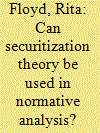| Srl | Item |
| 1 |
ID:
109594


|
|
|
|
|
| Publication |
2011.
|
| Summary/Abstract |
While securitization studies have paid considerable attention to the moral value of desecuritization, they have paid almost no attention to the morality of securitization. In this article, I attempt to rectify that situation by proposing a revision of securitization theory that specifies three criteria that - if fulfilled at the same time - would render a securitization morally right. The criteria are: (1) that there is an objective existential threat; (2) that the referent object of security is morally legitimate; and (3) that the security response is appropriate to the threat in question. Although what is suggested here is considerably removed from the Copenhagen School's original securitization theory, it is akin to that framework insofar as it retains the functional distinction between the security analyst and the securitizing actor. Indeed, the development of criteria that determine the moral rightness of securitization is analogous to the Copenhagen School's devising criteria that determine both the existence and the success of securitization.
|
|
|
|
|
|
|
|
|
|
|
|
|
|
|
|
| 2 |
ID:
192159


|
|
|
|
|
| Summary/Abstract |
Interest and anxiety about China’s economic statecraft, or the ways in which it uses economic means to achieve foreign policy, is booming. The overriding perception is that China has sophisticated, long-term plans to enhance its power on the global stage through the use of economic strategies and tools and that it is uniquely capable of effectively implementing those plans now or in the future. Yet when it comes to actual outcomes, whether or not China has been able to achieve its foreign policy goals via economic means, the evidence is mixed at best. This article seeks to move beyond some of the shortcomings in our understanding of Chinese economic statecraft by exploring the links between perceptions, ambitions, abilities, and outcomes of Chinese foreign economic policies and behaviour. We propose an alternative to the concept of economic statecraft by introducing instead five different ‘modes of economic influence’. We suggest directions for future research focused on China’s economic influence, including its latent structural power.
|
|
|
|
|
|
|
|
|
|
|
|
|
|
|
|
| 3 |
ID:
186194


|
|
|
|
|
| Summary/Abstract |
How effective are states at assessing and predicting the nuclear intentions of foreign countries? Drawing on close to 200 US assessments of foreign countries’ proliferation intentions between 1957 and 1966, this research note finds that close to 80 percent of testable US assessments were correct and that they shifted from highly inaccurate in the late 1950s to highly accurate in the 1960s. Based on quantitative and qualitative analysis, I conclude that learning from early failures led the intelligence community to achieve higher accuracy.
|
|
|
|
|
|
|
|
|
|
|
|
|
|
|
|